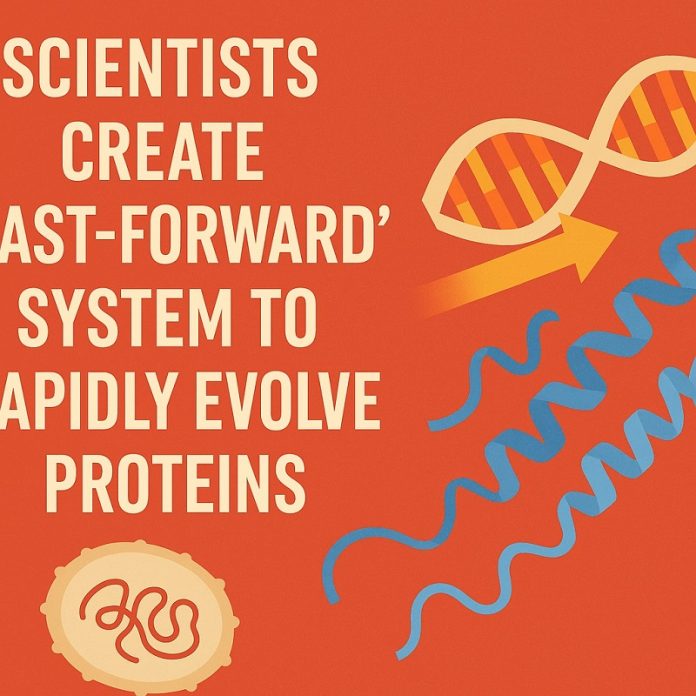
In medicine and biotechnology, creating proteins with new or improved abilities is essential for developing better treatments and tools.
But in nature, evolution takes time—and even in the lab, current methods for evolving proteins are often slow and require a lot of manual work.
Now, scientists at Scripps Research have developed a new synthetic biology platform called T7-ORACLE that can speed up protein evolution thousands of times, potentially transforming the way scientists design therapies for diseases like cancer and Alzheimer’s.
“Think of it as giving evolution a fast-forward button,” said Pete Schultz, co-senior author of the study and President of Scripps Research.
“We can now evolve proteins continuously and precisely inside cells, without harming the cell’s DNA or doing repetitive, time-consuming steps.”
Traditionally, scientists use “directed evolution” to improve proteins. They make mutations, test the results, and repeat the process over many rounds—sometimes taking a week or more per round.
Continuous evolution methods aim to streamline this by letting proteins mutate and adapt inside living cells with each round of cell division, which for bacteria happens roughly every 20 minutes. But until now, such systems have been complex, slow, or limited in their mutation rates.
T7-ORACLE overcomes these limits by giving E. coli bacteria a second, artificial DNA replication system.
This is based on the T7 bacteriophage, a virus known for its simple and efficient DNA copying machinery.
The researchers engineered the T7 DNA polymerase to be error-prone, causing it to mutate target genes at a rate 100,000 times higher than normal—without harming the bacteria’s own genome.
This means scientists can insert any gene—whether from humans, viruses, or other organisms—into a plasmid (a small, circular piece of DNA) inside the E. coli. T7-ORACLE mutates the gene rapidly, and scientists can then select for proteins with improved properties.
Because E. coli is easy to grow and widely used in labs, this system is convenient, scalable, and requires no specialized equipment.
To prove its effectiveness, the team used T7-ORACLE to evolve TEM-1 β-lactamase, a common antibiotic resistance enzyme.
In less than a week, the system produced enzyme variants able to survive antibiotic concentrations up to 5,000 times higher than the original. Even more striking, many of the mutations matched those found in real-world drug-resistant bacteria, and some new combinations were even more effective.
“This wasn’t about studying antibiotic resistance,” explained co-senior author Christian Diercks. “It was a demonstration. The point is, we can evolve virtually any protein—therapeutic enzymes, cancer drug targets—in days instead of months.”
The potential applications are huge. Scientists could evolve antibodies to fight specific cancers, design enzymes to break down disease-related proteins, or develop new catalysts for clean energy. The method’s simplicity means that any lab already working with E. coli could adopt it quickly.
Schultz’s long-term vision is to rebuild core biological processes, such as DNA replication and protein production, so they operate independently from the host cell’s normal functions. This opens the door to engineering entirely new kinds of genetic systems, including the ability to evolve polymerases that can copy synthetic DNA-like molecules with unique chemical properties.
For now, the Scripps Research team is focusing on evolving human-derived enzymes for medical use, as well as proteases designed to target cancer-linked proteins.
“The beauty of T7-ORACLE,” said Schultz, “is that it combines the precision of rational protein design with the speed of continuous evolution—making the discovery of powerful, functional molecules faster and easier than ever.”



